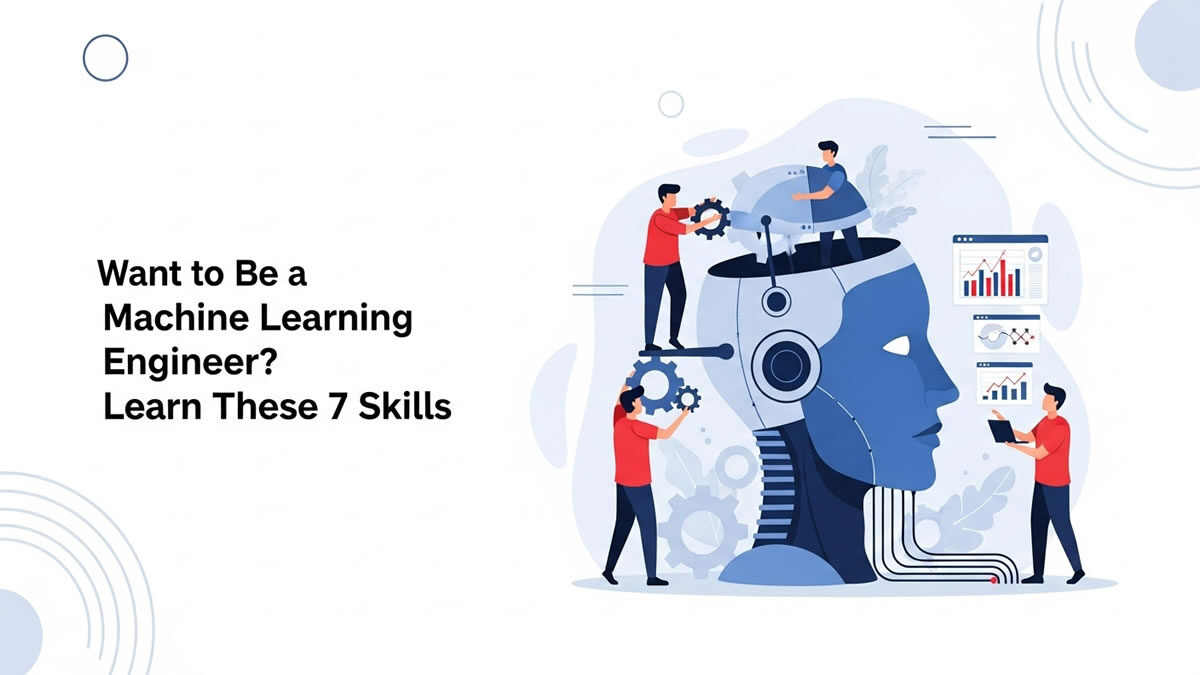Becoming a Machine Learning Engineer is one of the most exciting career choices in today’s tech-driven world. These professionals are the minds behind systems that can analyze data, learn from it, and make predictions or decisions without explicit programming. From self-driving cars to voice assistants, machine learning powers the future of technology.
But to enter this field, you need more than enthusiasm; you need the right skills. Let’s explore the seven essential skills every aspiring Machine Learning Engineer must master to stand out in this fast-growing industry.
Read More: Apple Wallet Digital ID Turns Your Passport into a Smart Digital Identity
1. Programming Proficiency
A Machine Learning Engineer must have strong programming skills. Coding is the foundation for building, testing, and optimizing machine learning models. The most popular programming languages in this field are Python, R, and Java. Python is widely used due to its simplicity and the large number of libraries such as NumPy, TensorFlow, and scikit-learn.
These tools help in data manipulation, model building, and deployment. R is great for statistical analysis and visualization, while Java helps in large-scale production systems. Learning programming helps you think logically, break problems into smaller parts, and automate repetitive tasks. It’s not just about syntax; it’s about problem-solving.
2. Strong Understanding of Mathematics and Statistics
Mathematics is the language of machine learning. A Machine Learning Engineer must understand how algorithms work under the hood. Key areas include linear algebra, calculus, probability, and statistics.
Linear algebra is used to represent data in the form of matrices and vectors. Calculus helps in optimizing models through gradient descent and other techniques. Probability and statistics are vital for understanding patterns, randomness, and model evaluation. Without a solid math foundation, you may know how to use tools but not how they work. A true engineer goes beyond code and understands the science behind it.
Read More: How AI Is Revolutionizing Space Exploration
3. Data Handling and Preprocessing
Data is the heart of machine learning. Before training any model, the data must be cleaned, organized, and prepared properly. A Machine Learning Engineer spends most of their time in data preprocessing, handling missing values, dealing with outliers, and normalizing data for better performance.
You should know how to use Pandas and NumPy for data manipulation, and visualization tools like Matplotlib or Seaborn to explore data patterns. Understanding how to split data into training and testing sets and applying feature engineering techniques is essential. Clean data leads to accurate models. If your data is poor, your results will be unreliable, no matter how advanced your algorithms are.
4. Knowledge of Machine Learning Algorithms
Every Machine Learning Engineer must master core algorithms. These algorithms teach machines how to learn from data. There are different types, such as supervised, unsupervised, and reinforcement learning. In supervised learning, you train the model using labeled data examples, including Linear Regression, Decision Trees, and Support Vector Machines.
Unsupervised learning deals with unlabeled data using techniques like K-Means Clustering and Principal Component Analysis (PCA). Reinforcement learning involves systems that learn through rewards and penalties, like game-playing AI. Understanding when and why to use a specific algorithm is a critical skill. It separates beginners from real engineers.
Read More: Top Future Tech Trends Defining 2025 and Beyond
5. Deep Learning and Neural Networks
Modern AI advancements are driven by deep learning. A Machine Learning Engineer should understand how neural networks work. Deep learning involves multiple layers of neurons that can detect complex patterns in data such as images, speech, and text.
Frameworks like TensorFlow, Keras, and PyTorch make it easier to build and train neural networks. These tools are essential for applications like image recognition, natural language processing, and autonomous vehicles. You don’t need to be an expert at the start, but having a good grasp of how models like CNNs, RNNs, and transformers work will make you future-ready.
6. Model Evaluation and Optimization
Building a model is just half the job. Evaluating and optimizing it is what makes it successful. A Machine Learning Engineer must know how to measure performance using metrics like accuracy, precision, recall, and F1 score. Techniques such as cross-validation, regularization, and hyperparameter tuning help in improving model performance.
It’s also important to understand the bias-variance tradeoff to avoid overfitting or underfitting. The goal is not just to create a model that works but one that performs well on unseen data. Optimization ensures your models are reliable in real-world scenarios.
Read More: Claude Code Web App: Anthropic’s Next Step in AI Coding
7. Deployment and Production Skills
Once a model is trained, it must be deployed for real-world use. This step requires understanding MLOps, which stands for Machine Learning Operations. It combines machine learning with DevOps principles to automate the deployment, monitoring, and updating of models.
Tools like Docker, Kubernetes, and Flask help in deploying machine learning models as APIs or microservices. Cloud platforms such as AWS, Azure, or Google Cloud offer scalable environments for model hosting.
A Machine Learning Engineer should also know about version control with Git, as collaboration and tracking changes are vital in large projects. Deployment bridges the gap between research and production, turning your code into something truly useful.
Bonus Skill: Problem-Solving and Communication
Beyond technical expertise, a Machine Learning Engineer must think critically and communicate clearly. Every project starts with a problem, and you must translate that problem into a machine learning solution.
You’ll often work in teams with data scientists, developers, and product managers. Strong communication ensures that complex ideas are understood by everyone. Creativity and curiosity also play a major role in exploring innovative solutions. Technical skills may get you hired, but problem-solving and collaboration will help you grow in your career.
Read More: Top Insights from the 2025 Freelance Platforms Market Report
TheTechCrunch: Conclusion
The journey to becoming a Machine Learning Engineer requires continuous learning and practical experience. It’s not about mastering one language or algorithm. It’s about combining skills from programming, math, data science, and system design. Start small. Learn to code, understand the math, and practice with real datasets. Build projects that challenge you and explore open-source tools.
Machine learning is transforming the world, and those who master it will shape the technology of tomorrow. Equip yourself with these seven essential skills, and you’ll be on your way to becoming a successful Machine Learning Engineer.
Read More: Best Generative AI Tools 2025


